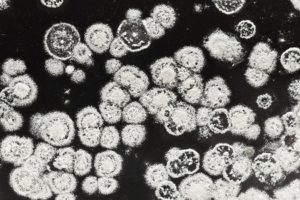The Science of Mold
 If you have been keeping up with our tips on waterproofing to prevent mold as well as how to spot it and remediate it, then you might stop and ask this question: What exactly is mold? This strange substance has a complex science behind it.
If you have been keeping up with our tips on waterproofing to prevent mold as well as how to spot it and remediate it, then you might stop and ask this question: What exactly is mold? This strange substance has a complex science behind it.
Mold is a Fungus
Basic biology will explain that all living things are classified by a set of categories, or kingdoms, such as plants and animals. Mold falls under the fungi kingdom, and fungus is a bit tricky because by definition it’s not a plant or an animal, but it behaves similarly to either category depending on what type of fungus it is. Mushrooms, for example, act like plants while yeast behaves like bacteria. Likewise, mold is very similar to yeast in the way that it spreads and reproduces.
How Mold Grows
You know that mold thrives in moist, dark places, which is why keeping areas of your house like your basement dry is so important. But where does the mold come from? When mold reproduces, it creates tiny seeds called spores. Spores are very lightweight and resistant to extreme hot and cold, and that helps them to travel long distances by air or water until they land on a surface where they can start growing. Nearly all spores are microscopic, and because they can be anywhere, it is pretty much impossible not to carry them into your house from outside. Once landed, the spores will sprout and start feeding. Mold eats organic materials which can be anything from rotting food to leather and even paper or human hair.
Why Mold is Dangerous
If the thought of spores being everywhere potentially makes you feel paranoid, then it should help to know that spores by themselves are harmless in small quantities. However, the growth of mold in your home will lead to several problems. When mold feeds, it is using enzymes that break down the surface where it is growing. In nature, it is part of the beneficial life cycle for decomposing fallen logs or dead animals, but it is definitely not something you want to happen to the drywall in your house. Also, there are some varieties of mold that are hazardous to your health. The infamous black mold, Stachybotrys, releases toxins that can cause respiratory problems. If you ever suspect there is mold in your house, a professional mold inspection will tell you which type it is. Even more harmless varieties of mold can cause respiratory illness in people with weaker immune systems, such as children and the elderly, because of the spores it spreads.
Contact All Aspects Waterproofing
For more information on how to protect your home from mold and allergens, contact All Aspects Waterproofing, a Better Business Bureau A+ rated company with over 30 years of experience in the Washington, DC. /Maryland/Virginia area. Contact us online or by calling 1-866-999-3110 or 301-766-4420. To see what we’re up to, follow us on Facebook, Twitter, Pinterest, YouTube, LinkedIn, and Houzz.
